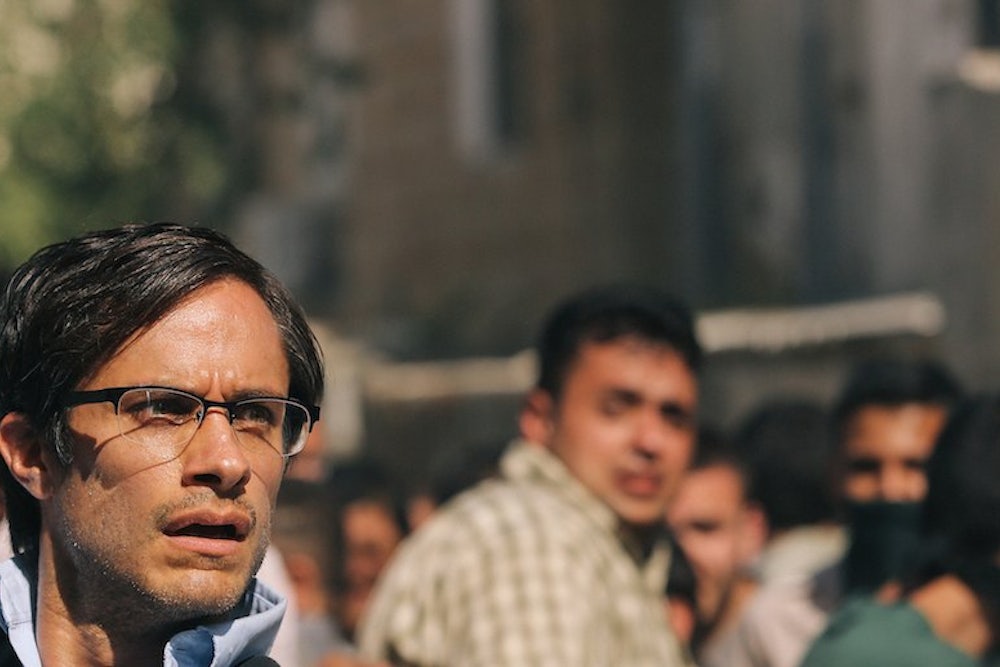If it weren’t for the name of its director, Rosewater would likely slip in and out of theaters without much fanfare, just one of the reasonably well-made, based-on-a-true-story films that we expect from the fall movie season. But the earnest docudrama is also Jon Stewart’s directorial debut, and while he never steps onscreen, the comedian’s presence is hard to forget. Stewart spent last summer away from his “Daily Show” desk to film the story of Maziar Behari, an Iranian-Canadian journalist imprisoned in a Tehran jail for 118 days, and the film doesn’t ever shake off the weight of those expectations. As we would expect from Stewart, the movie is politically engaged, raising arguments for the importance of an independent press and a free democracy, but the main question Rosewater grapples with is whether Stewart can hack it as a filmmaker. The answer: sort of?
“The Daily Show” plays a small role in the story of Behari, played by a slightly geeky (and very Mexican) Gael Garcia Bernal. In Tehran to report on the 2009 elections for Newsweek, Behari sits for an interview with “Daily Show” correspondent Jason Jones: Jones pretending to be an American spy, Behari gamely playing along. The regime didn’t quite get the joke, and it’s just one of the reasons Behari is arrested a few days later. While the movie is capably directed, Stewart makes some muddled visual choices, with fussy flairs that the story doesn’t need. The importance of social media to the Green Revolution is shown with shiny, floating hashtags that look like they were imported from some Verizon commercial. Scenes of eager young revolutionaries mixed in with real footage from 2009 seem perfunctory.
It’s only when Behari is dragged into a prison cell that this turns into a real movie. Held in solitary confinement, Behari is blindfolded, harassed, and accused of spying for Western governments— “CIA, MI6, Mossad, Newsweek,” specifically. His interrogator—Behari can identify him by the smell of his cologne, rosewater, and so that’s the only name we know him by—plays the “Daily Show” interview online, pointing at the laptop as some kind of smoking gun. (Behari’s deadpan response: “Why would a spy have a television show?”)
As Rosewater, the Danish actor Kim Bodnia gives the film’s most fully realized performance, equal parts sad and frightening. It’s a surprisingly vulnerable, empathetic portrayal—torturer as browbeaten bureaucrat, anxious to impress his boss and please his wife, but ready at any moment to bash Behari’s head in. This isn’t a fresh idea (I think someone once wrote a book about it?), but it’s complex in a way the rest of the movie isn’t, hinting at the more interesting film this could have been—something like The Live of Others, a bracing look at the dehumanization of life under a police state, for both prisoner and guard.
The scenes between Behari and Rosewater also allow Stewart to do something he’s very good at—be funny. The interrogation process is both grueling and surreal, and Stewart has an eye for those absurdities. Behari’s “Sopranos” DVDs are treated as pornography when he's taken into custody. Trips to New Jersey are automatically suspicious. And who is that Anton Chekhov mentioned on your Facebook profile? Midway through his confinement, Behari begins to distract Rosewater by appealing to the man’s prurient side, concocting deadpan tales of Western decadence and erotic massages. For his next film, Stewart should take things a little less seriously.
